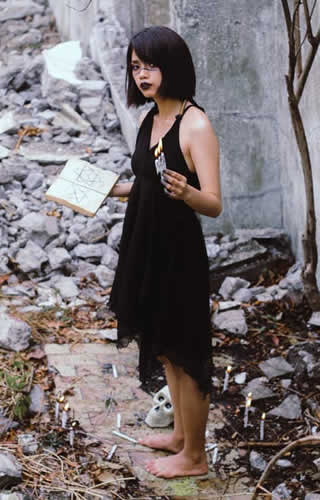Witchcraft
Are you interested in witchcraft? Do you want to learn about it and perform real magickal spells to manifest your every desire while transforming your life?
This section of the site deals with all things related to witchcraft.
I look at what it is, how it is used in reality and what a newcomer to it can expect to gain from learning about it.
What is Witchcraft?
It is traditionally explained as being the exercise or invocation of what are alleged supernatural powers in order to control people or events, by employing practices typically involving what is popularly thought of as sorcery or magic.
Although it can be defined differently in any number of disparate historical and cultural contexts, the practice of witchcraft has often been seen as the work of crones, especially in the West. These crones are believed to meet secretly at night, to indulge in things like cannibalism and orgiastic rites with the Devil while performing black magic.
The way that Witchcraft is defined above can be more accurately seen as existing more in the imagination of contemporaries rather than in any objective reality.
Yet for all the skewed beliefs that exists, this stereotype has a very long history. Its very existence spans many cultures and elicits viable explanations of evil in the world. The intensity lent to these beliefs is well represented by the prolific European witch hunts around the 14th to 18th century.
However, witchcraft and its associated ideas and practices are never all that far from the surface of popular consciousness. Its exaggerated beliefs are sustained by folk tales and manage to find explicit focus every so often in popular television shows, big screen movies and also in fiction.
The modern English word witchcraft has three principal connotations: the practice of magic or sorcery worldwide; the beliefs associated with the Western witch hunts of the 14th to the 18th century; and varieties of the modern movement called Wicca, frequently mispronounced "wikka."
How is Witchcraft Defined?
The terms "witchcraft" and "witch" derive from Old English wiccecraeft
This word is derived from "wicca" (masculine) or "wicce" (feminine). These two words are pronounced "witchah" and "witchuh" respectively. The terms denote a person who practices sorcery. The latter part of the word,
There are other roughly equivalent words in existence in other European languages, for example: hexerei (German), sorcellerie (French), stregoneria (Italian) and brujería (Spanish). These words have different connotations whereas none precisely translates another.
The difficulty of understanding the practice becomes even more muddied with the relevant words in African, Asian and a number of other languages.
Defining witchcraft explicitly becomes problematic and is made more difficult due to the concepts underlying these words that alter according to time and place and sometimes quite radically. Witchcraft beliefs in different cultures do not share a coherent pattern. They often amalgamate other concepts such as visual magic, religion, theology, folklore, sorcery, technology and diabolism.
A number of societies regard a witch as being a person possessing inherent supernatural powers. However, in the mainstay of Western culture, witchcraft is more commonly believed to be the free choice of an ordinary person to learn and practice magic with the help of the supernatural.
Therefore, to answer the old question "Are there such things as witches?" depends upon individual beliefs and definition since no single definition exists.
One thing is quite certain, however: the popularly viewed image of a witch in art, literature, theatre and film bears very little relation to the external reality.
Related Articles
Below are the titles to articles related to this topic published in this section: